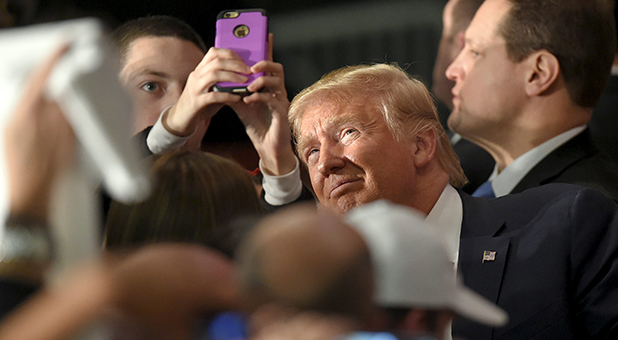Is Donald Trump’s Rise A Perfect Storm?
Conservatism is in decline and Donald Trump is the beneficiary. Despite important and significant victories at the state and local level, a coherent national message eludes conservatives. Narrow and ill-prepared candidates with an angry and frustrated voter base has created a volatile electorate paving the way for a candidate like Donald Trump.
Since 1988, conservatives sliced and diced their support among many conservative candidates. Whether it was Pat Robertson, Gary Bauer, Alan Keyes, Pat Buchanan, Ben Carson, Herman Cain, or Steve Forbes, they represented small pieces of the conservative movement with no hope of creating consensus or unifying the movement. This combined with a few vanity candidates who were never prepared to run for president, let alone become president, created distracting news cycles filled with stories about Egyptian pyramids, the age of the Earth, or the mispronunciation of names of foreign leaders. A consistent conservative message never emerged amid this division and distraction.
These candidates and the people who supported them grew out of frustration. The palpable distrust between the base and the elite is powerful and persistent. Elite opinion makers and policy makers seem to look down on those who believe in conservative values. So those who value the importance of a national border and lawful immigration are called nativists. Those who question international trade agreements that seem to pick winners and losers are called protectionists. Those who question massive government intervention to deal with climate change are called climate deniers. Those who believe in a restrained foreign policy are called isolationists. And, those who see traditional values and the rule of law questioned, condemned, and ridiculed are called haters and out of step. It is no wonder that the frustration of the base turned to the strong appeals from Donald Trump.
Finally, a fearless voice to fight back the mainstream media, the establishment, and the politically correct.
To the extent the public associates conservatism with the Republican Party, the frustration is also political. After two Bush presidencies over three terms, the conservative message has been harmed and diluted by violating “no new taxes” pledges, enacting Medicare Part D, signing into law No Child Left Behind, and massive government spending and ballooning deficits. Each Bush presidency was followed by even more liberal and progressive presidents. The rise of Hilary Clinton and Barack Obama can be traced to the disastrous outcomes of the first and second Bush presidencies. Conservatives at the grass roots attempted to correct the Bush presidencies with dramatic victories in 1994 and 2010. However, feckless Republican leaders failed to nationalize these historic victories in the presidential races of 1996 and 2012. Bob Dole won a mere 19 states and Mitt Romney could not turn the energy of 2010 to his advantage. It is no wonder that the base is so frustrated with political leadership, and no wonder that Donald Trump is eager to fill the void.
The failure of Republican leaders in the Congress to push a bold conservative agenda also infuriates the base that elected them. To this very date, the Republican leadership has yet to produce a substitute for Obamacare. Instead, many principled conservatives who advocated conservative reform were openly mocked by congressional leaders as “wacko birds” or “crazies.” These were hardly kind and gentle words to average voters who delivered massive Republican victories in 2010 and 2014.
This is fertile ground for a candidate who energetically says that he can get the deals done.
Conservative candidates for president have also failed to articulate a compelling, credible, consistent, and comprehensive vision that not only unifies conservatives, but also reaches out to the middle of America. No one national candidate has yet to master the unifying themes of restrained government, free markets, religious liberty, the rule of law, and a strong national defense. Instead, many conservative candidates get caught up in petty political disputes, purely symbolic issues, and narrow arguments. Conservative candidates caught up in division and distraction fail to paint a compelling national conservative vision. Worse, the conservative voting public gets caught up in supporting candidates hopelessly ill-prepared to be president, unable to give meaning to a national conservative agenda, or too fickle to unite behind a credible candidate. Add up the poll numbers of just the conservative candidates in the latest Fox News Iowa poll and the race is not even close. A conservative candidate would easily defeat Donald Trump even without the votes of Bush, Christie, or Kasich.
The cumulative impact of narrow political candidacies, ill-prepared candidates, and a voting base frustrated with being shut out by elite opinion makers created a vacuum for a strong personality to steal the national show.
The rise of Donald Trump is the perfect storm of a leaderless, issueless, divided, and fickle national conservative movement. {eoa}
Samuel G. Casolari is a trustee of Grove City College and a contributor to The Center for Vision & Values.














































